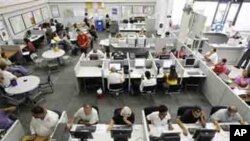The final -- and gloomy - jobs report released by the U.S. Labor Department released ahead of November's midterm elections showed the unemployment rate remained at a stubborn 9.6 percent. This report is seen as a key indicator of the health of the U.S. economy, which political analysts say that is not good news for President Barack Obama and Democrats in Congress as November 2, Election Day, approaches.
The economy and high unemployment rate are the top issues in this year's election campaign, and President Obama has said his administration remains focused on job creation as a high priority.
"Putting the American people back to work, expanding opportunity, rebuilding the economic security of the middle class is the moral and national challenge of our time," said the president.
Republicans were quick to react to the September job figures as well. House Republican leader John Boehner issued a statement that called the report disappointing and left millions of Americans asking, where are the jobs?
Public opinion polls give Republicans an advantage heading into the midterm elections and political analysts are predicting Republican gains in both the House of Representatives and the Senate. It's the state of the economy that is driving voters away from the Democrats and toward the Republicans, says political expert Thomas Mann of the Brookings Institution.
"The unemployment, the underemployment, the sort of stagnant income, the declining income for some families. All of that has created a great sense that nothing is working in this country. People are very bleak about the state of the economy," Mann says.
Public approval ratings for President Obama and for Democrats in general have been slipping for months now, and, somewhat surprisingly, approval ratings for Republicans in Congress tend to be even worse. But voters appear poised to hold the Democrats responsible for the sluggish economy on November 2, says Quinnipiac University pollster Peter Brown.
"And until the unemployment rate gets markedly better, it is unlikely that voters will be any more optimistic about the economy, and therefore that will probably not be good for President Obama," Brown says.
The state of the economy always has a significant impact on national elections, and this year Republicans appear to be benefiting from voter concerns that the U.S. economy is still trying to recover from a recession. The weak economic outlook has shaped a public mindset that took hold months ago, says Republican pollster and political strategist Ed Goeas.
"We know as political pollsters that it basically takes six solid months of good economic news for the economic mentality of the American populace to turn from a recession mentality to a growth mentality," Goeas says. "This election cycle will be run as a recession-attitude, recession-mentality [election] in terms of the voters who are out there."
Republicans charge that the Obama administration's economic stimulus plan, the bank bailout and the health care reform law have all held back economic recovery. Democrats fire back that a Republican takeover of Congress in November would bring a return to the economic policies of former President George W. Bush, who they say was responsible for the economic downturn to begin with.
High Unemployment Could Hurt Democrats in Midterm Vote




